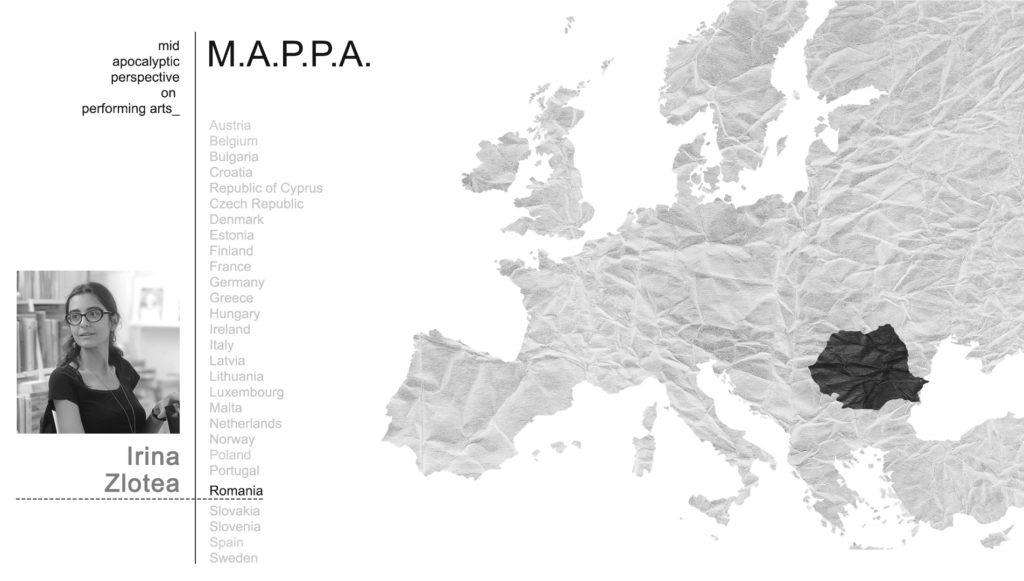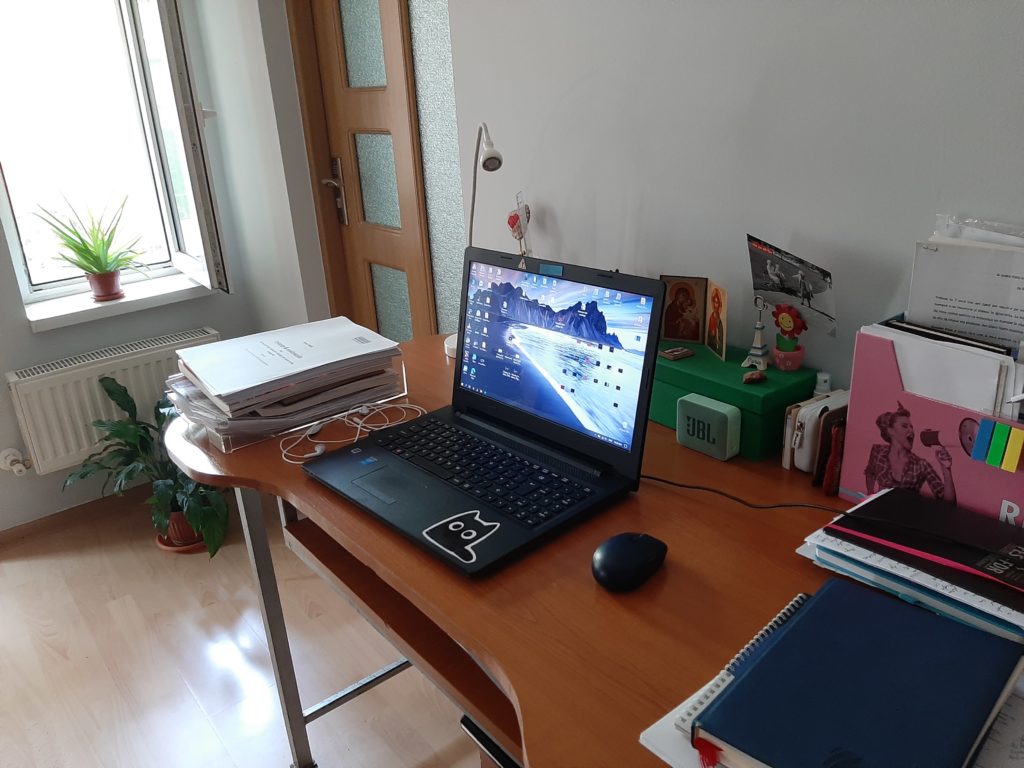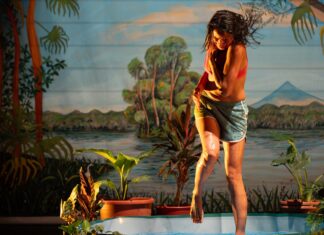
M.A.P.P.A. è un progetto di ricognizione e mappatura: teatro e performing arts in Europa durante la pandemia da Covid-19. Come stanno reagendo governi, teatri, artisti e osservatori alla crisi dello spettacolo dal vivo? Abbiamo intervistato giovani giornalisti, osservatori e critici provenienti da tutta Europa.
Leggi le altre interviste di M.A.P.P.A.
Irina Zlotea è nata e vive a Bucarest, è critica teatrale ed editor presso Teatrul azi, una delle più antiche riviste rumene dedicate alle arti dello spettacolo. È inoltre redattrice del dipartimento di Radio Drama della Radio Broadcasting Company rumena. Si è laureata in Studi teatrali – Giornalismo culturale presso l’Università Nazionale di Teatro e Film di Bucarest e ha conseguito un master in Editing presso la Facoltà di Lettere dell’Università di Bucarest. È coautrice ed editrice di numerose monografie dedicate a figure importanti del teatro rumeno. Già segretaria artistica e assistente alla regia al Teatro Nottara di Bucarest.
Quali misure sono state prese a sostegno dei lavoratori dello spettacolo in Romania?
I teatri pubblici potrebbero ricevere un budget sufficiente per il pagamento degli stipendi e per finanziare al minimo un piccolo numero di produzioni, siccome l’AFCN (Amministrazione del Fondo Culturale Nazionale) ha sensibilmente limitato i finanziamenti per progetti culturali indipendenti già dalla primavera. Su iniziativa del senatore Vlad Alexandrescu (ex Ministro della Cultura), gli artisti indipendenti (solo singolarmente) hanno la possibilità di accedere a fondi governativi con una domanda, per un sussidio di circa il 75% del salario medio a coprire un lasso di due mesi. Alcuni gruppi di supporto collettivo casuali (e insufficienti) sono apparsi all’inizio del lockdown, raccogliendo donazioni per gli artisti teatrali. Tuttavia, resta un problema per ogni compagnia e teatro indipendente trovare soluzioni ai loro problemi finanziari. L’UNITER, l’associazione rumena di artisti teatrali, non ha rilasciato dichiarazioni ufficiali in merito a tale questione, né ha intrapreso alcuna azione concreta o proposto alcuna strategia per superare questa crisi.
Quali sono le misure previste riguardo alle riaperture dei teatri?
Dal 1° giugno sono ammessi spettacoli all’aperto, concerti e qualsiasi tipo di manifestazione artistica con un pubblico massimo di 500 persone, tenendo conto delle raccomandazioni e degli obblighi ufficiali: indossare mascherine, tenere i due metri di distanza tra il pubblico, disinfezione delle mani, ecc. Le prove sono consentite in base alle misure di sicurezza per lavorare in spazi aperti. Il sindaco di Bucarest ha disposto l’apertura dei teatri nella capitale il 15 giugno, tuttavia il Ministero della Cultura si è opposto ufficialmente a questa decisione, nella preoccupazione di evitare nuovi focolai. In precedenza, si era dichiarata la possibilità che i teatri di tutto il paese riaprissero al massimo delle loro capacità, con prove in spazi chiusi, dopo il 30 giugno. Anche questo però non lo trovo realistico. Spero che i teatri riaprano in autunno, ricevendo il loro pubblico attraverso lo stesso rigoroso protocollo di sicurezza sanitaria implementato da altre realtà europee. Non sono ottimista riguardo ai festival, che sembrano ormai compromessi per il 2020.
Il periodo del lockdown ha visto molti teatri e compagnie pubblicare su internet parte dei loro archivi. Molte sono anche le performance nate online, così come si parla sempre più di residenze digitali. Persino i festival, luoghi di incontro per eccellenza, stanno proponendo un cartellone digitale. Come vi relazionate a queste modalità di fruizione?
Per me la natura del teatro (di tutti i tempi) è riunire le persone, fisicamente e metaforicamente. Durante il blocco ho sperimentato un diverso tipo di riunione mediata. Ho letto commenti entusiasti di persone che non andavano più a teatro da anni perché una malattia li aveva tenuti lontani dai contesti affollati. I rumeni che vivono in altre parti del mondo adoravano guardare le produzioni nazionali e ascoltare la loro lingua madre sulla scena virtuale. Ho avuto l’opportunità unica di godere delle registrazioni d’archivio di spettacoli che conoscevo solo dal materiale fotografico, anche da altri paesi. Ho discusso con colleghi e amici su cosa abbiamo visto: ho imparato così tanto e ne sono grata! Mi sono davvero sentita parte di una comunità globale di amanti del teatro. È così che andrà il teatro d’ora in poi? Spero di no, ma immagino che nessuno possa opporsi all’evoluzione digitale. Tuttavia, credo che il fatto che il teatro abbia trovato in questi giorni una modalità discreta di tenere le persone unite, oltre la differenza di tempo, di spazio, la lingua ecc… In questi giorni travagliati e incerti, grazie alla tecnologia, è una delle cose migliori che abbiamo avuto.
Quali sono state le pratiche performative più interessanti durante i giorni del lockdown dal tuo punto di vista?
Sono molto orgogliosa dei miei colleghi che hanno trovato la volontà e il coraggio di provare qualcosa di diverso: vorrei citare Exeunt realizzato da Bobi Pricop presso Reactor (uno spazio per esperimenti creativi a Cluj-Napoca), descritto come un poema performativo live, in cui l’esperienza intima, introspettiva, che gli attori hanno vissuto durante il lockdown viene messa in mostra. Così, in qualche modo si cerca la riunione fra attori e spettatori. Sempre a Cluj, un altro interessante progetto è iniziato alcuni giorni fa e sarà disponibile per un mese – Pool (no water) (opera teatrale di Mark Ravenhill, diretta da Radu Nica, prodotta dal Teatro Ungherese). È un’esperienza di 48 ore, che può essere fruita per frammenti, disponibile con i sottotitoli in inglese e rumeno.
Credi che questa crisi cambierà profondamente i linguaggi, gli spazi, i temi delle arti performative?
Mi aspetto diverse produzioni che documentino questa epidemia e l’esperienza di isolamento in sé, ma spero anche in alcune esperienze artistiche che evidenzieranno i problemi cruciali che questa minaccia globale ha svelato. Perché non è l’epidemia in sé di cui Saramago parla in Cecità, ma la pestilenza all’interno della società. Non vedo l’ora di vedere temi più significativi in scena.
Temo però che il possibile crollo economico possa influenzare maestranze come scenografi, produttori di maschere, light designer, ecc. La loro creazione dipende fortemente dagli investimenti che un produttore è disposto a fare. Poiché prevediamo significativi tagli finanziari nei teatri pubblici e difficoltà nel finanziamento di progetti indipendenti, probabilmente molti artisti saranno costretti a cambiare linguaggio.
È possibile vivere del mestiere del critico in Romania?
In Romania non si può vivere scrivendo recensioni teatrali. Quasi tutti i critici dell’arte performativa, che di fatto sono pochissimi, hanno uno o più lavori, spesso nel campo culturale, che assicurino più entrate. Sono docenti universitari, manager della cultura, curatori, traduttori ecc. Ma ci definiamo critici. È un vero lavoro, mal pagato e mal gestito. È la percezione di questo lavoro ad avere molteplici problemi: credo che una delle radici principali di questo status ambiguo e instabile derivi dalla tacita sensazione che la nostra professione abbia perso il suo scopo. Essere un critico teatrale è come stare tra mondi, dove il proprio status e la credibilità dipendono davvero dall’etica professionale.
Che cosa ti manca di più della dimensione live delle arti performative?
Oh, ci sono molte cose che mi mancano, ma soprattutto mi manca quel dialogo inespresso che si verifica tra gli attori con gli attori e fra questi ed il pubblico. Mi manca lo scambio energetico che modella in tempo reale lo spettacolo o il gioco, rendendolo un’esperienza unica e reciproca. Mi mancano quei piccoli eventi imprevedibili, perché le piccole imperfezioni rendono un’esibizione dal vivo più preziosa e memorabile per il pubblico. Potrei andare avanti all’infinto con tutte le cose che amo e che mi mancano delle esibizioni dal vivo e delle rappresentazioni: l’odore dei vecchi teatri, il girovagare prima di prendere posto, il silenzio quando le luci si abbassano o la stranezza di un’esibizione che inizia prima che te ne renda conto gli applausi…

Irina Zlotea lives in her hometown Bucharest and is theatre critic and editor at Teatrul azi, one of the oldest Romanian printed publications dedicated to performing arts. She is also editor for the Radio Drama Department at the Romanian Radio Broadcasting Company. She graduated Theatre Studies – Cultural Journalism at the National University of Theatre and Film in Bucharest and has a master degree in Book Editing at the Faculty of Letters of the University of Bucharest. She is co-author and editor of several monographies dedicated to important figures of Romanian theatre. Previously she worked as artistic secretary at Nottara Theatre in Bucharest and has experience as assistant director.
What are the measures overtaken by the Romanian government, or by the local institutions, in support of the theatre workers?
Public theatres might receive enough budget for merely paying the salaries and poorly financing the minimum number of productions, especially since AFCN (Administration of the National Cultural Fund) already has visibly limited their funding for independent cultural projects in this spring session.At the initiative of senator Vlad Alexandrescu (former Minister of Culture), the independent artists (individuals only) have the possibility to access governmental funds by an application, for an income of about 75% of the medium wage covering the two months lockdown. Some random and scarce collegial support groups and voices appeared at the beginning of the lockdown, collecting donations for the independent theatre artists. However, it is still the problem of each independent company and theatre to find solutions for their financial problems. UNITER – The Romanian Association of Theatre Artists made no official statements concerning this matter, neither took any concrete actions or come with a strategy to overcome this crisis.
What are the dates and measures concerning the reopening of theatres?
From June 1st are allowed open space performances, concerts and any kind of artistic manifestations (with a maximum audience of 500) considering the official recommendations and obligations: wearing masks, 2 m distance between audience, hand disinfection etc. Rehearsals are permitted following the health safety measures for working in open spaces. On June the 13th the Mayor of Bucharest announced the opening of theatres in the capital on June the 15th, respecting health safety measures. However, the Minister of Culture and the GSC (Group for Strategic Communication) officially oppose this decision since everyone tries to avoid a new outbreak. GSC previously declared to discuss the possibility of theatres from all over the country to open at their fullest capacity and having rehearsals in closed spaces after June 30. Even so I don`t find it realistic. Hopefully in autumn all theatres will open, receiving their audience through the same strict health safety protocol implemented by other European theatres. However, I am not optimistic about the theatre, dance and music festivals, they seem compromised for 2020.
During the lockdown many theatres and companies published part of their archives on the Internet. Also, we have been watching many digital performances, as well as there has been an intensive talking about “digital residences”. Even the festivals, that can be seen as the most evident meeting places, are proposing a digital billboard. How do you relate to this way of enjoying the performing arts?
In my opinion, the core purpose of theatre (in all times) is to bring people together. Physically and metaphorically. During the lockdown I experienced a different kind of mediated togetherness. I read excited comments from people who used to go to theatre but an illness has been keeping them away from social gatherings for years. Romanians that live in other parts of the world loved watching Romanian productions and hearing their mother tongue on stage. I had the unique opportunity to watch archive recordings of performances that I knew only from photos, and I enjoyed productions from theatres from other countries. I discussed with colleagues and friends what we watched. I learned so much and I am grateful for that! I really felt part of a global community of theatre lovers. Is this the way theatre will be like from now on? Hope not, but I guess one cannot oppose evolution. Yet, I do believe that the fact that theatre found a gentle way to keep people together (in spite of time difference, distance, language etc.) in these troubled and uncertain days, thanks to technology, is one of the best things we had.
The most interesting alternative theatrical practices you have experienced in these days
Honestly, I cannot say I experienced anything extraordinary in terms of alternative theatrical practices. It might be because I haven`t engaged in anything experimental or different from recorded theatre and performances. However, I am very proud of my colleagues that found the will and courage to try something alternative. I would mention Exeunt made by Bobi Pricop at Reactor (a space for creative experiments in Cluj-Napoca), described as an online live performative videopoem. It approaches the intimate stories of the performers and feellings that one had during lockdown presented as isolated artistic introspections. It intends to invade the spectator`s home space, with the final purpose of physical reunion of the performers and therefore of the audience. Also in Cluj, another interesting project has started a few days ago and will be available for one month – pool (no water) (Mark Ravenhill`s play, directed by Radu Nica, produced by The Hungarian Theatre). It is an alternative theatrical experience that can be watched fragmentary during 48 hours. I think is available with English and Romanian subtitles. I haven`t seen it yet, but I am very excited about it.
Do you think the current state-of-things will affect the language, the topics, the space of the performances etc…in deep? If yes, how?
I expect from Romanian artists several productions that document this epidemic and isolation experience per se, but I hope for some artistic experiences that will go after the burning issues that this global threat has unveiled, for is not the epidemic itself that Saramago speaks about in his Blindness, but about the pestilence inside the society, politics and human beings. Therefore, I look forward to having more meaningful themes on stage. I am afraid that the possible economical crash might affect artists such as set-designers, mask makers, light-designers etc. Their creation highly depends on the investments a producer is willing to make. Since we expect significant financial cuts in public theatres and difficulties in funding independent projects, probably many artists will be forced to change aesthetics.
What is the labor framework of the performance art criticism in Norway?
In Romania, one cannot live from writing theatre reviews. Therefore, almost all performance art critics (which are actually very few) have one or more jobs/projects in the cultural field that brings them income. They are book editors, academics, cultural managers, performance curators, translators etc. But we do call ourselves critics. It is a real job, badly paid and managed. The perception of the performative art critic has multiple issues and I do not have enough space to write about them here. Yet I do believe that one of the main roots of this ambiguous and instable status comes from the tacit feeling that our profession has lost purpose. Being a theatre critic is more like being between worlds, and your status and credibility truly depends on your own professional ethics.
What do you miss most from live performances and plays?
Oh, there are many things I miss, but mostly I miss that unspoken dialogue that occurs between the performers/actors and the audience. I miss the energetic exchange that shapes in real time the performance or play, making it a unique, mutual experience. Also, I miss those unpredictable small events, because those small imperfections make a live performance more precious and memorable for the public. Actually, I could go forever with all the things I love and miss about live performances and plays. The smell of old theatres, the roam when the audience gets to their seats, the silence when lights dim, or the strangeness of a performance that starts before letting you know, the applause… everything, I guess.
Leggi le altre interviste di M.A.P.P.A.












